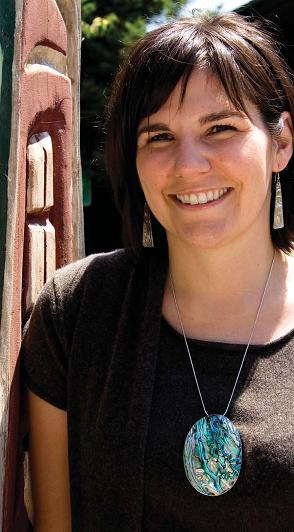
Listen to Carmen Lansdowne recite poetry to tribal music
Featuring "Haida Love Song," sung in Hailhzaqvla by Josh Vickers, Kevin Starr, Terry Reid, Doug Brown Jr., Brett Waterfall, Max Johnson Sr., Thomas Dixon, Ian Reid, Curtis Campbell, Ayla Brown, Rory Housty, Travis Hall, Eric Wilson and William Housty
The Rev. Carmen Lansdowne is also called Kwisa’lakw by one of the aboriginal peoples of Canada’s central northwest coast. The name, given her by tribal elders at a ceremonial potlatch, means “woman who travels far,” and acknowledges the globetrotting work of this 34-year-old doctoral student in Interdisciplinary Studies. Lansdowne serves on the World Council of Churches (WCC) executive committee, representing 560 million Christians in 110 countries and territories.
At the GTU, Lansdowne is preparing for a career teaching theology at a seminary, focusing her study on indigenous epistemologies, or ways of knowing, and Christian missiology. Ordained by the United Church of Canada, a denomination shaped by Methodism, Presbyterianism, and Congregationalism, she graduated in 2007 from the Vancouver School of Theology (VST) with a Master of Divinity.
|
“Churches can do a lot to regain |
 |
|
Lansdowne poses in Oakland by a totem pole |
Lansdowne was called back to the church of her childhood and to ministry in her early 20s. At the time she was studying to become a chartered accountant — a job she held a few years before starting VST — and serving an internship leading two rural congregations on the border of Alberta and Saskatchewan. She continues her work at VST on a Master of Theology, which she hopes to complete in 2010 as she pursues her doctorate in Berkeley.
“I came to the GTU,” Lansdowne says, “because I wanted to study mission and explore an indigenous perspective in a context that represented the mainline Protestant tradition I came from. The GTU’s Interdisciplinary Studies program was a perfect fit for me.”
Churches, she says, can do a lot to regain their prophetic voice about social justice in the world. “My hometown, Alert Bay, B.C.,” Lansdowne says, “is experiencing a decline in coastal fisheries. The aboriginal people are reaching out to the church, which asks, ‘What has this got to do with us?’ If the dominant society of Canada, including my denomination, wants to be in solidarity with indigenous communities, then restitution of culture, speaking out about economic impoverishment, and supporting successful ventures for aboriginals is what needs to happen.”
Lansdowne brings this view to her work for the World Council of Churches, which, in the past, helped lead the fight against South African apartheid, a legal system that, she notes, was modeled on Canada’s own Indian Act. She has visited the Occupied Palestinian Territories in her role as co-moderator of the Palestine-Israel Ecumenical Forum, a WCC program formed to coordinate global peace advocacy in WCC member churches, and she participates in WCC’s Indigenous Peoples Program. In 2006 she took part in the United Nations Permanent Forum on Indigenous Issues, and last year she traveled to the Philippines to start work on indigenous perspectives of ecclesiology (theologies of Christian self-understanding).
“The world is a smaller place than people imagine,” Lansdowne says. “If you think the world is big, it’s easy to feel disconnected from what’s going in a mining community in the Philippines or in rural Armenia. Participating in God’s mission in the world is at the heart of my Christian faith.”
